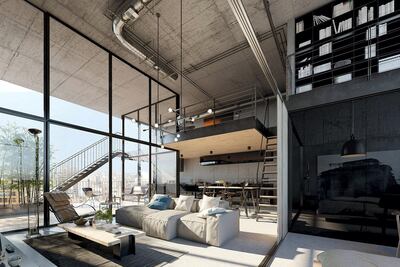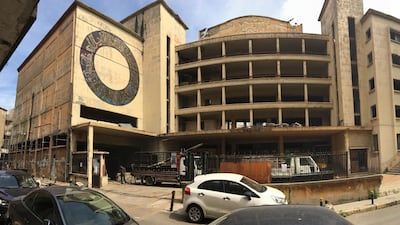For a brewery that has been closed for more than 30 years, the Grande Brasserie du Levant has received outsize attention in recent months as activists and the famous architect working on its redevelopment trade barbs over its fate.
In March, demolition of the five-storey building began in order to make way for luxury apartments. Mar Mikhail, the traditionally working-class neighbourhood in east Beirut where the brewery is located, has been gentrifying for a decade. But the brewery and its striking façade, built in 1933 to produce Laziza beer, had remained a local landmark, as well as a canvas for street artists.
In April, activists from Beirut Madinati, a group that advocates for greater transparency in Lebanon’s governing institutions and sustainable urban development, convinced the city’s governor to halt the demolition after raising several concerns.
Not only had the building's facade been pulled down despite architectural renderings that suggested it would be saved and incorporated into the new structure, the activists said, but they also questioned the effect the demolition would have on the local neighbourhood and whether enough had been done to preserve the building as a historic landmark.
The activists also raised concerns that sufficient safety measures had not been put in place before demolition work began.
Ghassan Salameh, an activist with Beirut Madinati, said officials should have held "some sort of town hall or neighbourhood committee meeting ... to tell the people what is happening, because this is a project which drastically changes the neighbourhood".
“When you bring this luxury villa project, you immediately raise the price of rents" in the area, he added. "Landlords are going to raise the rent or start kicking out tenants.”
________________
Read more:
Watch: Beirut street artist Yazan Halwani finds inspiration in city's 'lost culture'
Beirut's historical houses rise again as cultural hubs
A psychogeographic tour through Beirut
________________
But last month, demolition work on the brewery started up again.
“Even now when the demolition started again, we don’t really know what changed,” Mr Salameh said. “It’s impossible to get a straight answer.”
Hagop Terzian, a member of the Beirut municipal council, told The National that the main reason the demolition work had been halted by the city's governor in April was due to a lack of sufficient safety measures being in place, including nets to stop falling debris. All necessary measures had now been implemented, he said.
"I do respect the activists' opinions," Mr Terzian added. "But it is not a historical building under the law."
Bernard Khoury, the architect who designed the luxury apartments that are set to replace the brewery, is dismissive of his critics, accusing them of engaging in “demagoguery” and “naivety”.

Mr Khoury, whose firm is also currently involved in projects from Miami to Dubai, is Lebanon’s best-known architect. He is responsible for some of the most distinctive — and most talked-about — buildings erected in the country since the end of the civil war in 1990.
Though the pace of new construction has slowed in Beirut in the last five years, no one disputes that the city is being transformed. Many of its older buildings have disappeared, including hundreds of Ottoman-era homes. Prime minister Rafik Hariri, a construction magnate who made a fortune rebuilding downtown Beirut, oversaw the loosening of many building regulations in the 1990s. His signature project, Solidere, rebuilt the centre of Beirut’s downtown, which lay in ruins after the war. But it has been criticised for turning a once bustling district into a quiet and antiseptic neighbourhood unaffordable for most Lebanese.
Mr Khoury, 50, said he once shared some of the idealism of his current detractors.
"The question of heritage is something I've been tackling since the 1990s," he told The National. "In the 1990s, a lot of us were expecting a reconstruction project. Not just buildings, but the nation."
In the end, Mr Khoury said, he and others were forced to accept a “sour reality”.
“It became very obvious that Beirut was never going to be rebuilt [by the state] because the institutions were not there,” he said. “At the end of the day, it became evident that the projects were being driven by the private sphere … Beirut evolves in the absence of a master plan. This has brought about visible catastrophes today.”
“If you believe that architecture has some political content or political role — and I am one of those who still believes that … You have to understand the forces, the possibilities, the limitations,” he added. “That includes understanding the private sector and trying to construct meaning.”
________________
Read more:
Pretty profit belies struggle of property company Solidere
Revitalising Beirut's downtown an onerous task
Street art brings colour to rundown Beirut suburb
________________
Mr Khoury’s “answer is always that ‘It’s not my problem if there are no regulations from the government’. It’s an unethical position for an architect who claims he knows Beirut better than anyone else,” Mr Salameh said.
Activists were heartened that the movement to stop the demolition succeeded, if only briefly.
"I think developers are being challenged — maybe not being overpowered, but projects are being contested more than they used to," said Habib Battah, the editor of Beirut Report, a news website that frequently covers issues of gentrification and historic preservation.
There have been some successful efforts to stop developments in the area in the past. A proposed highway project that would have bisected Mar Mikhail was initially approved but fell apart three years ago after widespread opposition.
“I think there has to be a real reckoning,” Mr Battah said. “We’re really losing entire neighbourhoods.”
“We’re not saying that you need to stop building,” Mr Salameh said. “But why don’t we think about affordable housing?”
Mr Khoury argued that building new housing, whatever the price, will increase housing stock and lead to lower rents overall. He added that in the absence of regulations, he has done his best to create an accessible space that takes the character of the neighbourhood into account.


One of the problems for architects in Beirut is not having any control over what structure might later be built next door, Mr Khoury said.
“Every site is a solitary building trying to protect itself,” he explained, describing the city as “a small room packed with people who have turned their backs on one another”.
“That's why we see buildings being more and more sealed off (with high fences and walls) … Once we’re done, the people around should be grateful. We resisted an isolated building. We made a sponge, a building that is open.”
It is possible, however, that the fight over the brewery's redevelopment is not yet over.
“There will be more actions,” Mr Salameh promised.

